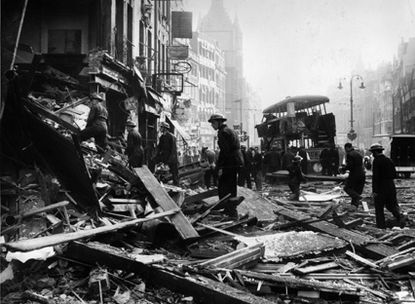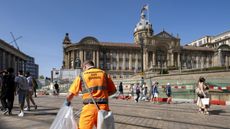A nation of looters: it even happened in the Blitz
Calls for the ‘Blitz Spirit’ following the riots are misguided: looting was rife in London's darkest hour

So David Cameron believes we live in a sick society where people loot at will and youngsters have no respect for authority. The gist of the Prime Minister's message on Wednesday seemed to be a lament for a more innocent era, a time when the Great British public would never have dreamt of looting shops and homes no matter how hard times might be. In other words, as more than one anguished commentator has said this week 'whatever happened to the Spirit of the Blitz?'
Yes, indeed, what ever did happen to that fabled Blitz Spirit that saw Britons – particularly Londoners – through the grim days of 1940 and 1941 when the German Luftwaffe raided the capital on 57 consecutive days and nights?
It's one of the great wartime myths that on the Home Front the British people stood as one. Many did, it's true, but just as we've seen a mindless display of opportunistic lawlessness from a few hundred men and women in recent days in London, Birmingham and Manchester, so a minority of Britons robbed and looted during the Blitz – and some of those involved were even younger than the 11-year-old who stood in Highbury Corner youth court on Wednesday accused of looting a Debenhams.
Subscribe to The Week
Escape your echo chamber. Get the facts behind the news, plus analysis from multiple perspectives.

Sign up for The Week's Free Newsletters
From our morning news briefing to a weekly Good News Newsletter, get the best of The Week delivered directly to your inbox.
From our morning news briefing to a weekly Good News Newsletter, get the best of The Week delivered directly to your inbox.
The Luftwaffe began its bombing of British cities on September 7 1940 and the raids continued with savage regularity until May 1941. London had it worst, but Coventry, Liverpool, Glasgow and Hull were also on the receiving end. It didn't take long for a hardcore of opportunists to realise there were rich pickings available in the immediate aftermath of a raid – and the looting wasn't limited to civilians.
In October 1940 Winston Churchill ordered the arrest and conviction of six London firemen caught looting from a burned-out shop to be hushed up by Herbert Morrison, his Home Secretary. The Prime Minister feared that if the story was made public it would further dishearten Londoners struggling to cope with the daily bombardments.
In November 1940 the Germans laid waste to Coventry - and looting there was as prevalent as in London. A 28-year-old man called Chrich was sentenced to three months' hard labour for stealing an 18th-century register from the city's cathedral, while three firemen were given six months for pilfering from a shop.
The looting was often carried out by gangs of children organised by a Fagin figure; he would send them into bombed-out houses the morning after a raid with orders to target coins from gas meters and display cases containing First World War medals. In April 1941 Lambeth juvenile court dealt with 42 children in one day, from teenage girls caught stripping clothes from dead bodies to a seven-year-old boy who had stolen five shillings from the gas meter of a damaged house. In total, juvenile crime accounted for 48 per cent of all arrests in the nine months between September 1940 and May 1941 and there were 4,584 cases of looting.
Joan Veazey, whose husband was a vicar in Kennington, south London, wrote in her diary after one raid in 1940: "The most sickening thing was to see people like vultures, picking up things and taking them away. I didn't like to feel that English people would do this, but they did."
Perhaps the most shameful episode of the whole Blitz occurred on the evening of March 8 1941 when the Cafe de Paris in Piccadilly was hit by a German bomb. The cafe was one of the most glamorous night spots in London, the venue for off-duty officers to bring their wives and girlfriends, and within minutes of its destruction the looters moved in.
"Some of the looters in the Cafe de Paris cut off the people's fingers to get the rings," recalled Ballard Berkeley, a policeman during the Blitz who later found fame as the 'Major' in Fawlty Towers. Even the wounded in the Cafe de Paris were robbed of their jewellery amid the confusion and carnage.
Then, as now, the newspapers demanded strong action from the government to curb the looting, though not even the most right-wing papers of 2011 went as far as the Daily Mirror did in November 1940.
"Fines and imprisonment have done nothing to stop the ghouls who rob even bodies lying in the ruins of little homes. Looting is in fact on the increase," thundered its editorial. "The country demands that this crime be stamped out... hang a looter and stop this filthy crime."
The Mirror never got its wish and prison remained the preferred punishment. So who knows, perhaps some of those men and women filing through English courts this week are just headed in the same direction as their grandparents 70 years ago.
Gavin Mortimer is the author of 'The Blitz', Osprey Publishing, 2010
Create an account with the same email registered to your subscription to unlock access.
Sign up for Today's Best Articles in your inbox
A free daily email with the biggest news stories of the day – and the best features from TheWeek.com
-
 India elections start amid violence, hate speech accusations
India elections start amid violence, hate speech accusationsTalking Points Narendra Modi seeks a third term while critics worry about the future of the country's democracy
By Joel Mathis, The Week US Published
-
 'Biden is smart to keep the border-security pressure on'
'Biden is smart to keep the border-security pressure on'Instant Opinion Opinion, comment and editorials of the day
By Harold Maass, The Week US Published
-
 Bird flu worries mount as virus found in milk, cows
Bird flu worries mount as virus found in milk, cowsSpeed Read The FDA found traces of the virus in pasteurized grocery store milk
By Peter Weber, The Week US Published
-
 Congress honors real-life Rosie the Riveters
Congress honors real-life Rosie the RivetersSpeed Read These American women reshaped the work force during World War II
By Peter Weber, The Week US Published
-
 Is David Cameron overshadowing Rishi Sunak?
Is David Cameron overshadowing Rishi Sunak?Talking Point Current PM faces 'thorny dilemma' as predecessor enjoys return to world stage
By The Week UK Published
-
 Will Aukus pact survive a second Trump presidency?
Will Aukus pact survive a second Trump presidency?Today's Big Question US, UK and Australia seek to expand 'game-changer' defence partnership ahead of Republican's possible return to White House
By Sorcha Bradley, The Week UK Published
-
 Can Cameron put the Falklands sovereignty dispute to bed?
Can Cameron put the Falklands sovereignty dispute to bed?Today's Big Question Foreign secretary says issue 'not up for discussion' ahead of visit amid renewed push from Argentina
By The Week UK Published
-
 It's the economy, Sunak: has 'Rishession' halted Tory fightback?
It's the economy, Sunak: has 'Rishession' halted Tory fightback?Today's Big Question PM's pledge to deliver economic growth is 'in tatters' as stagnation and falling living standards threaten Tory election wipeout
By Harriet Marsden, The Week UK Published
-
 Will America recognize a Palestinian state?
Will America recognize a Palestinian state?Today's Big Question Israeli leader Benjamin Netanyahu opposes the move. Some see it as the only route to peace.
By Joel Mathis, The Week US Published
-
 Fasting to burger buffets: the weird and wonderful diets of politicians
Fasting to burger buffets: the weird and wonderful diets of politiciansWhy Everyone's Talking About Rishi Sunak reportedly starts his week with a 36-hour fast
By Sorcha Bradley, The Week UK Published
-
 Why your local council may be going bust
Why your local council may be going bustThe Explainer Across England, local councils are suffering from grave financial problems
By The Week UK Published